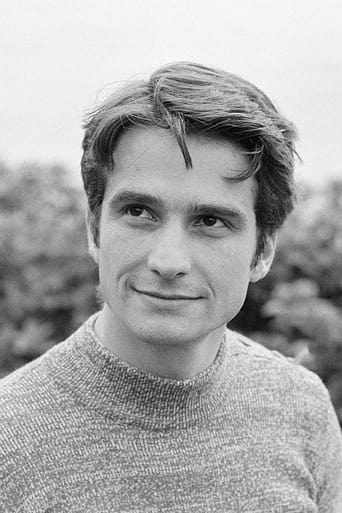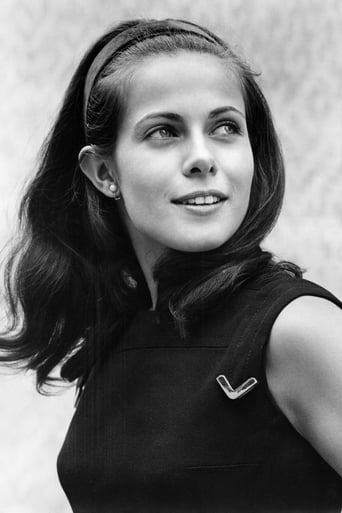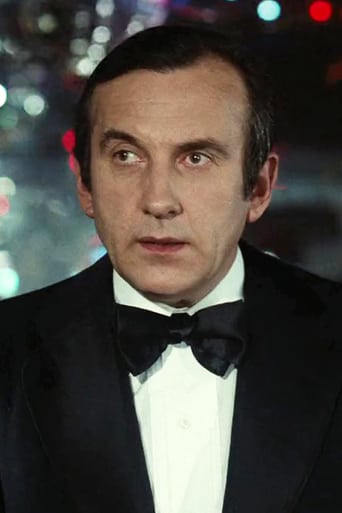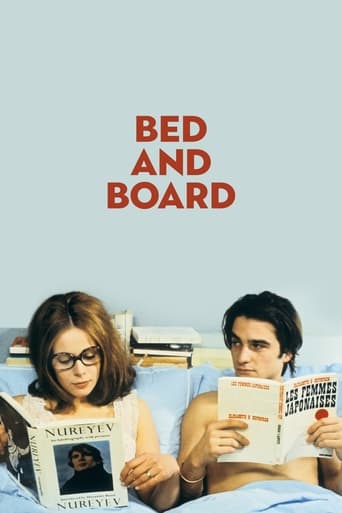
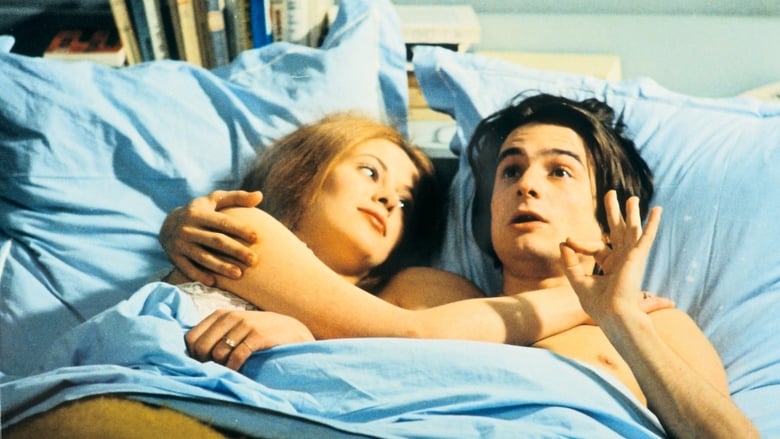
Bed and Board (1971)
Parisian everyman Antoine Doinel has married his sweetheart Christine Darbon, and the newlyweds have set up a cozy domestic life of selling flowers and giving violin lessons while Antoine fitfully works on his long-gestating novel. As Christine becomes pregnant with the couple's first child, Antoine finds himself enraptured with a young Japanese beauty. The complications change the course of their relationship forever.
Watch Trailer
Cast
Similar titles


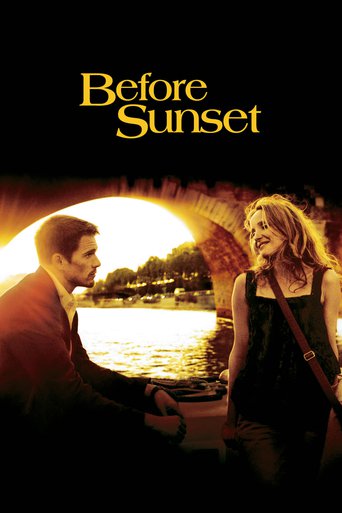
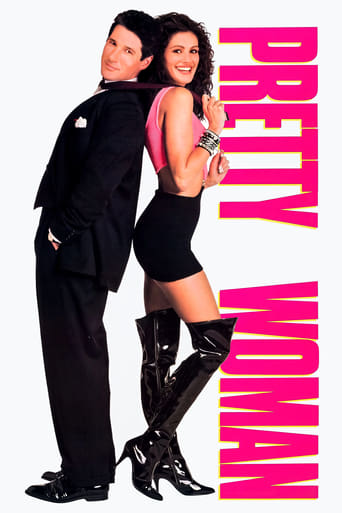



Reviews
Load of rubbish!!
The best films of this genre always show a path and provide a takeaway for being a better person.
The story-telling is good with flashbacks.The film is both funny and heartbreaking. You smile in a scene and get a soulcrushing revelation in the next.
It's easily one of the freshest, sharpest and most enjoyable films of this year.
Truffaut turns a banal story about a newly wed couple, the birth of their first child, young man's infidelity, their separation and reunion, into a fascinating study of conjugal universe. At first glance, the central characters Antoine and Christine may appear to be happy, yet, as the story unfolds one can see their difficulty of relating to one another. As is usual with Truffaut's films, Domicile Conjugal presents the viewer with a highly dense text that constitutes perhaps the director's greatest achievement in his life-long exploration of relationship between men and women.Truffaut's central symbol in this film is staircase. The characters constantly go up and down stairs. The psychoanalytic meaning of it is clear enough and has in fact been used by Hitchcock, whose films Truffaut found inspiring. Downstairs, a lascivious neighbor tells Antoine that she is going to have him soon. Money (another key psychoanalytic symbol) is also exchanged below as Antoine reminds an oblivious mother to pay for the music lessons that Christine (a violinist) offers to her daughter. By contrast, upstairs is the space of high art (in addition to Christine, there is an opera singer living next door). It is also a space of conjugal relations, or rather an attempt at such relation. As the first strains between Antoine and Christine become apparent, Antoine brings home a portable winding stairs and makes Christine mount it when she practices her violin. Unlike Freud and Hitchcock, Truffaut never quite claims that the high and sunny floors of our personality are a mere cover-up for the dark recesses of basic instincts. Nevertheless, the constant ups and downs in Domicile conjugal suggest that marital life involves a lot of interaction between an individual's consciousness and the unconscious. Antoine, an autobiographic central character of Truffaut's cinematic universe, is known to director's fans as a boy who never grew up. In his late twenties as in his early teens, Antoine is entirely in love with his fantasies. The film starts as he dyes a bunch of carnations red by adding a substance to the water in which the flowers stand. Eventually, his pursuit of the absolute red color (an absolute passion?) leads him to overdose and burn the flowers down. As Antoine and Christine lie in bed, he reveals his fantasy to her by reading an obscenity into a news paper column. Looking for a supposedly serious job with an American company, Antoine ends up occupying himself with piloting toy ships in a miniature haven arranged on a pond (Truffaut will use the same image later in his La femme a cote). A consummate egoist enchanted with his own inner world, Antoine embarks upon a graphomanic enterprise of writing a novel, which, in Christine's words, will be his childish revenge upon his parents (a reference to Truffaut's 400 coups, and its central theme of a parentless childhood).The infantile nature of Antoine's character is also apparent from his reaction to the news of the birth of his son. Significantly, Antoine does not hear his colleague who tries to shout to him over a distance that he has a boy, and learns the sex of the child by looking through a binocular at a magazine picture featuring a boy and a girl that the colleague shows. Being absolutely self-centered, he tells neighbors about the news, phones someone, but forgets to bring flowers to Christine on a first post-natal visit. And then he projects his own fantasies upon the baby, envisions him as a Napoleon of the literary world, and declares that he will be his son's sole educator (which references Truffaut's fascination with the 18th century educational ideas in his L'Infant sauvage). Finally, Antoine also does not forget to name the boy Alphonse despite the fact that Christine liked a different name.Yet, Christine is not very much different. The whole episode in which they disagree on the names for the baby simply suggests that fathers and mothers have different fantasies about their children, that men and women have different fantasies He calls Christine his sister, daughter or mother, while she imagines herself as his woman/wife (note the opening episode, when grocer and newspaper vendor call the newly wed Christine "mademoiselle" and she insists on being called "madame"). Whereas Antoine's pillow book is about Japanese women, Christine reads about Rudolf Nuriev, a famous ballet dance who had recently defected from the Soviet Union. As she and Antoine break apart, she takes his photo with their child out of the frame and one can see Nuriev's face below.Thus, the conjugal scenes in this film are a wonderful illustration of the idea that men and women take their fantasies with them as they go to bed. And yet, as Antoine's affair with the Japanese girl Kioyko demonstrates, pure fantasies are pure hell. Kioyko's foreignness indicates the impossibility of communication. The language is not the issue, as Kioyko speaks French. Yet, as Antoine soon discovers, it is impossible to converse with one's dream. As the screen of the French small talk disintegrates around him, Antoine finds himself alone with his pure fantasy of a woman, that is to say he finds himself alone pure and simple. For a garrulous Gaul like him, the silence of Antoine's last evening in restaurant with Kioyko proves to be a veritable torture from which he repetitively flees (upstairs!) to a telephone booth in order to TELL Christine that he loves her and kisses her tenderly. Yet, make no mistake: an ironic last episode of the film demonstrates that love between a man and a woman is a purely ritual thing that does or does not exist only for an external observer. Truffaut's bottom-line is that men and women are able to live together only when their fantasies do not clash with one another. Forever children, men and women play out their dreams together or alone. As Jacques Lacan argues (and Truffaut agrees), there can be no SEXUAL relationship
In "Bed and Board," the boyish Antoine Doinel (Jean-Pierre Léaud) settles down to married life with Christine (Claude Jade). But while it seems like a promising idea for this beloved character to move on to the next phase of his life, the film does not live up to its potential. "Stolen Kisses," the preceding movie, was a romantic comedy with such a consistently sweet and charming tone that it became something more than mere fluff. "Bed and Board" maintains the same sparkling tone for about the first hour. Christine and Antoine's apartment building is inhabited by the quirkiest group of Parisians to come along until "Amélie," thirty years later. (Both movies even have an old man who refuses to leave his apartment.) Indeed, the movie, and its hero Antoine, are in love with quirkiness: Antoine works dyeing flowers and operating remote-controlled model boats, which are even stranger than the odd jobs he held in "Stolen Kisses." There are also some tenderly idiosyncratic scenes between the newlyweds.But "Bed and Board" becomes much less interesting when it aims for a more serious tone and introduces infidelity into the plot: Antoine cheats on Christine with a Japanese woman, Kyoko. To add insult to injury, Kyoko is a blatant stereotype of the "exotic, submissive Asian woman," wearing kimono and writing calligraphy. Maybe Christine and Antoine were always a mismatched coupleChristine is very practical and bourgeois, while Antoine is a fanciful dreamerbut if he has to cheat on her, couldn't he do it with someone amusing?Obviously the Antoine Doinel series dealt with some very serious themes in its first installment, "The 400 Blows." But that movie was a unique, distinctive look inside the head of a troubled 14-year-old boy; however, the serious themes of "Bed and Board" are found in innumerable French movies about infidelity. It's too bad that "Bed and Board" falls so flat in its second half, because its first half is whimsical comedy at its best.
Unfortunately, I saw this film AFTER I saw the other Antoine Doinel films by Truffaut. Because it was seen out of sequence, I KNEW that Antoine was destined to destroy his happy marriage with his philandering. So, the movie was a wistful "what might have been" throughout for me. And this is a REAL shame, as the first 2/3 of the movie really captivated me. It was charming, the characters likable and I really found myself rooting for them--even though I KNEW it wouldn't last. If only Truffaut had resisted the cynicism that so permeated the French New Wave of the 1960s and 1970s--it was as if, according to an unwritten rule, they HAD to make the story a real downer. I don't mind movies that end sadly, but after a healthy dose of "marriage and love stink" movies from Truffaut (and many of his contemporaries), I can't help but feel depressed and wonder if I should spend more time watching Japanese, American or other types of cinema. CAN'T they just live happily ever after SOME TIMES!?
This is the fourth and penultimate film in Truffaut's semi-autobiographical series about the life of Antoine Doinel (Jean-Pierre Léaud). The movie depicts Doinel in the early years of marriage to his childhood sweetheart Christine Darbon (Claude Jade). The picture begins showing Antoine trying to scrape a living selling dyed flowers in the busy Parisian courtyard while his wife teaches violin in the apartment above. If this film was a novel you could rip half the pages out to represent the amount of storyline in the picture. But this does not take away anything from this piece of cinematic magic. Truffauts use of the camera and soundtrack is as usual the making of the film.It is obvious that this film is a one-man creation. How many filmmakers could you say that of today? The balance of characters, incidents and minute side glance at daily living restores your faith that art and craftmanship is making a tender comment on life can make a deep one too. The couple soon become parents and Antoine lands, by pure chance, an unprestigious job in a prestigious American construction company. But Domestic bliss soon tires our hero and he is tempted to the bed of a statuesque Japenese girl. The story is told with Truffauts usual wit and charm and filled with affectionate homages to filmmakers from Jean Renoir to Jaques Tati.
